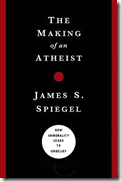Philosopher Dallas Willard writes, “[I]ndividuals with standing in a particular professional field sometimes feel free, or even obligated, to cloak themselves in the authority of their area of expertise and make grandiose statements such as this by a professor of biological sciences [Willard quotes William B. Provine of Cornell University]:
Let me summarize my views on what modern evolutionary biology tells us loud and clear. . . . There are no gods, no purposes, no goal-directed forces of any kind. There is no life after death. When I die, I am absolutely certain that I am going to be dead. That’s the end for me. There is no ultimate foundation for ethics, no ultimate meaning to life, and no free will for humans, either.
“Logically viewed, this statement is simply laughable. Nowhere within the published, peer-reviewed literature of biology—even evolutionary biology—do any of the statements of which the professor is “absolutely certain” appear as valid conclusions of sound research. One trembles to think that an expert in the field would not know this or else would feel free to disregard it. Biology as a field of research and knowledge is not even about such issues. It simply does not deal with them. They do not fall within the province of its responsibilities. Yet it is very common to hear such declamations about the state of the universe offered up in lectures and writing by specialists in certain areas who have a missionary zeal for their personal causes.”
— Knowing Christ Today: Why We Can Trust Spiritual Knowledge (HarperOne, 2009), 5.
Well said. I do admire Provine, however, for following his naturalism to its logical conclusions, and being willing to state those conclusions openly: there are no purposes, no life after death, no objective right and wrong, no meaning to life, and no free will. I absolutely agree with Provine that these are the logical implications of metaphysical naturalism. They are the stark realities that atheists of previous generations (such as Nietzsche and Sartre) embraced—and lamented. But most popularizers of atheism today want to have their atheism and eat their cake, too.
They want to proclaim a universe without deity, but also make moral pronouncements (as if they were something more than mere opinion), live as if the will is free (do they embrace atheism because it’s rational or because they couldn’t choose otherwise?), and maintain an unjustified optimism about human life and progress through science (why bother doing science if life has no meaning? Why even get out of bed every day? And how do we explain the great evil human beings are prone to do?).
Provine is right. But why anyone wouldn’t fall into the deepest depression if they held such beliefs is incomprehensible. Such propositions can live freely in the ivory tower of abstract academic thought, but they’re unlivable in concrete human experience. Thus, I can only conclude that those who hold such views don’t actually take them very seriously. If they did, we would witness their lives spiraling into chaos in a very short time.



























![Reblog this post [with Zemanta]](https://i0.wp.com/img.zemanta.com/reblog_e.png)


